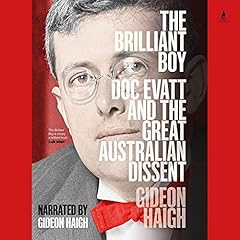
Quarterly Essay 87: Uncivil Wars
How Contempt Is Corroding Democracy
No se pudo agregar al carrito
Add to Cart failed.
Error al Agregar a Lista de Deseos.
Error al eliminar de la lista de deseos.
Error al añadir a tu biblioteca
Error al seguir el podcast
Error al dejar de seguir el podcast
 Exclusivo para miembros Prime: ¿Nuevo en Audible? Obtén 2 audiolibros gratis con tu prueba.
Exclusivo para miembros Prime: ¿Nuevo en Audible? Obtén 2 audiolibros gratis con tu prueba.Compra ahora por $12.28
-
Narrado por:
-
Scott Stephens
Is our democracy corroding? In this eloquent original essay, Waleed Aly and Scott Stephens explore the ethics and politics of public debate—and the threat it now faces.
In a healthy society we need the capacity to disagree. Yet Aly and Stephens note a growing tendency to disdain and dismiss opponents, to treat them with contempt. This toxic partisanship has been imported from the United States, where it has been a temptation for both left and right. Aly and Stephens discuss some telling examples, analyse the role of the media, and look back to heroes of democracy who found a better way forward.
Arguing that democracy cannot survive contempt, they draw on philosophy, literature and history to make an urgent case about the present.
‘So what do we owe those with whom we might profoundly, even radically, disagree? In our time, the answer increasingly seems to be: Nothing. Absolutely nothing. We've come to regard our opponents as not much more than obstructions in the road, impediments standing between us and our desired end. We have grown disinclined to consider what it might mean to go on together meaningfully as partners within a shared democratic project. To put it bluntly, we see no future with our political opponents because we feel we have nothing to learn from them.’ (Waleed Aly & Scott Stephens, Uncivil Wars)
Waleed Aly is a writer, academic, lawyer and broadcaster. He is a lecturer in politics at Monash University and a co-host of Network Ten’s The Project. He is the author of People Like Us and Quarterly Essay 37: What’s Right? With Scott Stephens, he co-hosts Radio National’s The Minefield program.
Scott Stephens is the online editor of Religion and Ethics for the ABC. He has been a lecturer in theology and ethics, and is editor of several books.
©2022 Waleed Aly and Scott Stephens (P)2022 Audible Australia Pty Ltd.Los oyentes también disfrutaron:




















The main issue they are discussing is public debate. In any society, there will be some disagreement. Even in the most united family, there is never a complete meeting of the minds and the more people you bring into the picture, the greater that will be. There must therefore be some way of expressing and dealing with disagreement. It is a sign of health. We all know that in some sense. The societies that the West most disparages are all societies where there is no freedom of debate.
So why is it that many democracies seem to be losing sight of that? They note that today’s society has often been characterized by “anger” but they argue that it isn’t anger, but contempt. We can be angry at someone and still respect them. We can be angry even at someone we love. Contempt is different. It is toxic. It says that the other person has no value and that their speech does not deserve to be heard. And they argue that it is an issue for both the right and the left.
The authors bring up examples (some from the US) and talk consider the role of the media, including social media, in feeding it. They argue that democracy assumes respect and will not survive on contempt and make a strong case.
I would highly recommend this for anyone who is concerned about where society is going. You can read the extract of the article on the journal’s website (Uncivil Wars: How Contempt Is Corroding Democracy | Quarterly Essay) and either subscribe or purchase the article to read the whole thing as well as getting it on Audible, Amazon, and Google Play. It’s one of the best and most balanced “political” articles I’ve read in a long time.
The Age of Contempt
Se ha producido un error. Vuelve a intentarlo dentro de unos minutos.


